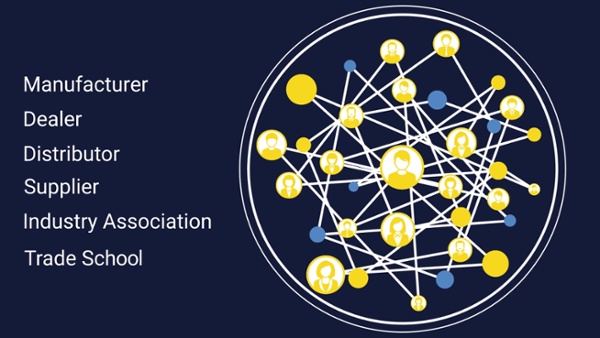Today, there is little doubt that ecosystem-based business models are in the process of reshaping the business landscape. According to a recent survey by Accenture Strategy, 76% of execs asked agreed that in five years business models will be almost unrecognizable – and that ecosystems will be the reason why.
Even right now, digital ecosystems are driving value in the manufacturing sector, among other areas. Businesses are coming to understand that robust networks of partnerships, rooted in data-sharing and collaboration, can create better and more efficient results – particularly when looking towards national or global expansion.
There’s no single right way to build an ecosystem, but based on our own extensive experience helping companies build their own ecosystems, we know the most critical factors for success.
What You Need To Build A Strong Digital Ecosystem
1. A solid software foundation
Ecosystems explicitly leverage Internet technologies and communication tools. Easy-to-deploy ecosystem solutions are becoming more common, but they have some things in common. These include:
- A cloud-based “access anywhere” central portal
- A strong focus on data collection, analysis, and reporting
- An array of communication and creation tools to encourage collaboration
- Tiered access rights, keeping public and private data separate
- Digital libraries of documents and technical matter
Of course, specific implementations will depend on each company’s own area of business, and overall goals.
2. A focus on “we” not “me”
Ecosystems are fundamentally collaborative, and based on the well-established principle that a rising tide lifts all ships. Creating your own ecosystem will be of great benefit to your company, yes, but it must also be of significant value to any other participants as well. Decisions regarding the ecosystem should be based in bringing the most value to every participant, not just yourself. Otherwise, you will struggle to find partners.
Speaking of which…
3. The right partners
You need partners with the vision to understand the benefits of ecosystems, as well as an internal culture which will embrace the concepts. Plus, of course, they also need to add significantly to the overall ecosystem, bringing benefit to everyone involved. Synergy is the name of the game here.
Partner recruitment should be a slow and thoughtful process, focusing on both their value today, as well as how that value can increase over the years to come.
4. A shared vision for success
The most successful ecosystems have clear long-term goals, beyond the obvious goal of growth and expansion. This will be one of your key hooks for bringing new partners onboard. Your ecosystem should represent a path towards a better tomorrow, one which is going to create even more opportunities for everyone involved. If all your partners share in this vision, its success is much more certain.
The FUSE Has Been Lit…
FUSE by LogicBay is the industry’s premiere open-access ecosystem-building tool, designed to allow businesses of all sizes to create and manage an ecosystem, while producing ample incentives for new partnerships. With more than a decade of ecosystem-building experience, we can help put you at the forefront of the next revolution in business strategies.

